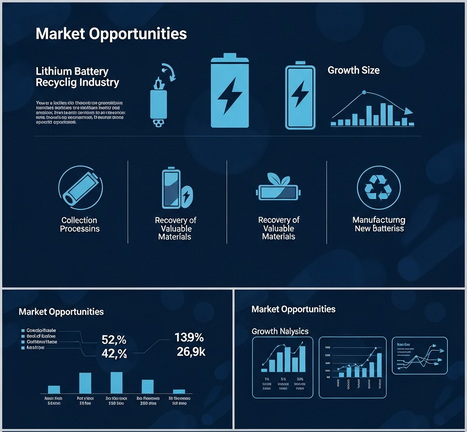As the global demand for electric vehicles (EVs), renewable energy storage, and portable electronics surges, lithium-ion batteries have become the cornerstone of modern energy systems. However, with millions of these batteries approaching the end of their lifecycle, a new market is gaining momentum — lithium battery recycling.
The lithium battery recycling industry is no longer just an environmental initiative — it’s a thriving commercial opportunity. Governments, investors, and manufacturers alike are recognizing the economic and strategic importance of reclaiming valuable materials like lithium, cobalt, and nickel from spent batteries.
📈 Why the Market is Booming
1. Rapid EV Adoption
Electric vehicle sales are expected to reach over 60% of total car sales by 2035. With this growth comes a surge in battery waste, creating massive opportunities for recycling businesses.
2. Raw Material Scarcity
Lithium and cobalt are finite resources. As demand outpaces supply, recycling becomes an essential strategy to recover these critical minerals and reduce dependency on mining.
3. Favorable Government Policies
Countries like India are introducing Extended Producer Responsibility (EPR) norms and subsidies for setting up recycling infrastructure, accelerating interest in lithium battery recycling plant setup.
4. Cost Savings for Manufacturers
Recycling allows battery manufacturers to reduce input costs by using recycled materials, making the business case even stronger.
💰 Business Opportunities in the Recycling Chain
Here’s where entrepreneurs, investors, and businesses can tap into the booming recycling economy:
🔄 1. Battery Collection Networks
There’s a growing need for businesses that collect used batteries from households, retailers, and industrial users.
🏭 2. Lithium Battery Recycling Plant Setup
Setting up a lithium battery recycling plant can be highly profitable. The plant processes spent batteries using mechanical, hydrometallurgical, or pyrometallurgical methods to extract valuable materials.
🚛 3. Logistics & Handling
Transporting hazardous battery waste requires specialized logistics — another emerging sub-sector in this industry.
🔬 4. Technology & Automation
Innovations in battery sorting, material recovery, and AI-powered recycling tools offer significant scope for tech startups and automation firms.
🌍 Global and Indian Market Potential
The global lithium-ion battery recycling market is projected to exceed $18 billion by 2030, growing at over 20% CAGR.
In India, the government’s push for EV adoption and local battery manufacturing under the PLI scheme is expected to create a $1.5 billion recycling opportunity by 2027.
🏗 How to Start a Lithium Battery Recycling Plant
If you’re planning a lithium battery recycling plant setup, consider the following steps:
- Feasibility study & market analysis
- Regulatory compliance (CPCB authorization in India)
- Selecting a suitable recycling technology
- Plant design, procurement, and setup
- Hiring skilled personnel and safety training
- Partnerships for battery sourcing and material off-take
Companies like Shanit Global provide end-to-end support for setting up such plants, including turnkey solutions and technical consultation.
✅ Conclusion
The lithium battery recycling industry is a goldmine of opportunity for forward-thinking businesses. Whether you’re looking to invest, build infrastructure, or offer services in the supply chain, now is the right time to act.
With increasing battery waste, resource scarcity, and government incentives, there’s never been a better moment to explore the lithium battery recycling plant setup market.



